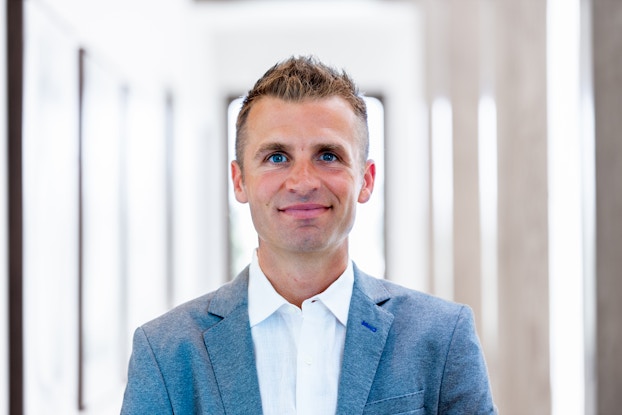Three best practices integral to startup growth, according to Austin Allison, Founder and CEO of Pacaso:
- Achieve ‘operational excellence’ before scaling a business, Allison says. ‘Before you can scale up, it’s important to have a product-market fit — a product that people are interested in and they’re willing to buy, and a model that delivers value to customers.’
- Assemble a team that’s staffed with workers with institutional knowledge on the product or service your business sells, and the market dynamics of their industry. ‘Institutional knowledge is something all entrepreneurs can benefit from,’ he says.
- Before committing to a business venture, make sure you’re passionate about the idea. Sheer passion for a business idea has a way of seeing entrepreneurs through the challenges they will inevitably face, Allison says, and ends up becoming a kind of ‘superpower.’
In October 2020, entrepreneur and former Zillow executive Austin Allison launched Pacaso, a tech-enabled real estate platform designed to help people buy second homes affordably and hassle-free via a co-ownership model that aimed to fill an unmet need in the housing market.
Today, Pacaso’s customers co-own homes across the U.S. and Europe in 40 markets — from a house in California wine country to a villa in Ibiza, Spain.
Six months after launch, the business scored a $1 billion valuation, record timing in the startup world for achieving coveted unicorn status.
But Allison will tell you that Pacaso was no overnight success.
Its origins date back to his start selling real estate as an 18-year-old and the lessons he learned in the years spent working three jobs and living paycheck to paycheck to follow his entrepreneurial muse. That led to Allison’s first stint founding a real estate startup with the 2008 launch of software platform dotloop, which he later sold for $120 million to Zillow, where he continued to run the business.
After leaving Zillow, taking a year off, and buying a second home in Lake Tahoe, his “happy place,” Allison conceived Pacaso. “I wanted to make that second homeownership dream possible for more people,” he said.

Solving an unmet consumer and housing-market need
Pacaso’s fractional home-buying site, which boasts listings such as 1/8 ownership of a house in Santa Barbara to 50% ownership of another in Kiawah Island, aims to make second home ownership, a highly discretionary purchase, affordable to folks for whom it’s been prohibitively expensive.
Co-owners book homes via a tech-enabled SmartStay scheduling solution designed so that popular vacation dates are equitably distributed among co-owners, then Pacaso does the rest — from paying bills on owners' behalf to handling repairs to furnishing the home.
Allison says Pacaso’s business model seeks to counter the negative ripple effect traditional second home ownership can have on the housing market and local communities. “These houses sit empty 80% to 90% of the year, and when a house sits empty, it creates problems for the housing industry and communities at large,” he said.
For one, it strains local businesses, as absent owners are not there to support them most of the year. And by purchasing homes that sit mostly empty, second home buyers shrink housing stock for the local, year-round workforce, which drives up home prices and makes it harder for people to afford primary homes, according to Allison. “At Pacaso, we’re introducing and enabling a more sustainable and more efficient use of this housing stock, which is creating more opportunities for the local residents to afford primary homes.”
[Read: 3 Startups in Fast-Growing Niches Detail Plans to Accelerate Business in 2022]
No matter the industry, “Institutional knowledge is something all entrepreneurs can benefit from,” Allison said, noting writer Malcolm Gladwell’s oft-cited theory that it takes 10,000 hours to master a task.
Pacaso’s growth pillars: passion and hard-won institutional knowledge
While Pacaso’s $1 billion unicorn status six months after launch garnered headlines, the quick-win narrative was misleading, Allison said. “Oftentimes what appears to be an overnight success was a lot of work and effort leading up that success.”
Pacaso is instead a startup two decades in the making that’s the sum of Allison’s (and his team’s) hard won institutional knowledge on the real estate industry via his stints founding dotloop and then running it at Zillow; business relationships he’s nurtured over a decade; and the passion for an idea that he “started thinking about in childhood,” he said. (Sheer passion for a business idea has a way of seeing entrepreneurs through the challenges they will inevitably face, he says, and ends up becoming a kind of “superpower.”)
Allison brings two decades of “tribal knowledge” to Pacaso: “I know what motivates real estate agents, what their pain points are, how the brokerage industry works, how analysts and trade associations work,” he said. No matter the industry, “Institutional knowledge is something all entrepreneurs can benefit from,” Allison said, noting writer Malcolm Gladwell’s oft-cited theory that it takes 10,000 hours to master a task.
He then staffed Pacaso with former colleagues and cohorts who brought industry expertise to the table. “I think that had a lot to do with why we were able to hit the ground running,” he said. “We are an average of the people we surround ourselves with.”

Scaling Pacaso by nailing ‘operational excellence’ and tapping into a ‘massive’ addressable market
With a seasoned real estate team in place, Pacaso first aimed to achieve “operational excellence” as a new and nascent business, Allison said. That meant “thinking small before thinking big. Before you can scale up, it’s important to have a product-market fit — a product that people are interested in and they’re willing to buy, and a model that delivers value to customers,” he said.
The startup then tapped into a huge addressable market (the total demand for products or services offered), which ignited growth.
Allison learned the importance of understanding market sizing running dotloop, a subscription tool that was widely adopted by real estate agents, but “didn’t become that big of a business based on the value and the revenue,” he said. “There are just not a lot of dollars spent annually on productivity software in the real estate space.”
By contrast, Pacaso tapped into an exponentially larger addressable market. “It’s a massive opportunity,” he said. “There are about a 100 million second homes around the world, and tens of millions of people aspire to own second homes.”
Benefiting from remote-work culture: ‘We can recruit and attract people from anywhere in the world’
Pacaso’s distributed business model, whereby employees have worked remotely since the startup launched eight months into the pandemic, enabled the business, unencumbered by geographic constraints, to build just the team it envisioned, which has become a competitive edge, Allison said. “We can recruit and attract people from anywhere in the world, because we’re casting a wider net.”
What’s more, work-from-home culture fosters worker well-being by allowing for more family time and a “more free and autonomous way of life for our employees,” he said. ‘That’s important because quality of life matters.”
CO— aims to bring you inspiration from leading respected experts. However, before making any business decision, you should consult a professional who can advise you based on your individual situation.
Follow us on Instagram for more expert tips & business owners’ stories.
CO—is committed to helping you start, run and grow your small business. Learn more about the benefits of small business membership in the U.S. Chamber of Commerce, here.
CO— Exclusives: Insider Strategies
How the buzziest brands and hottest startups are solving today's biggest business challenges. CO— brings you advice from startup founders and top executives for thriving in a new world.








